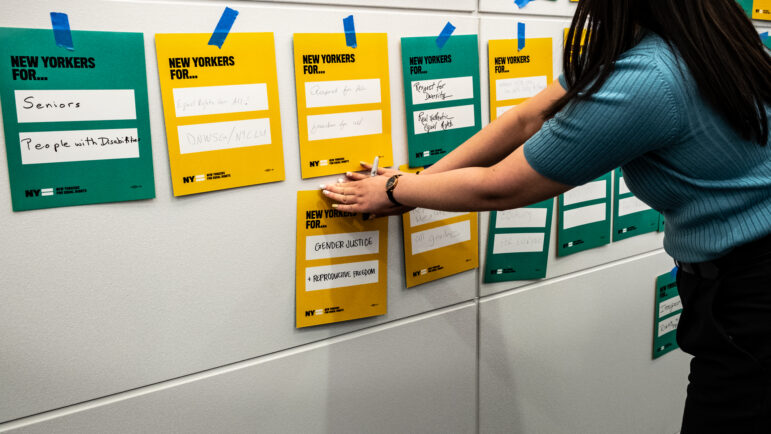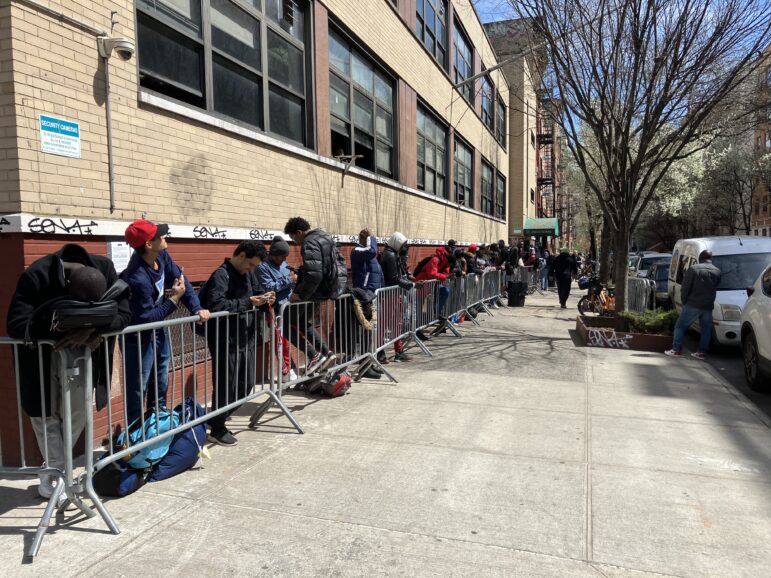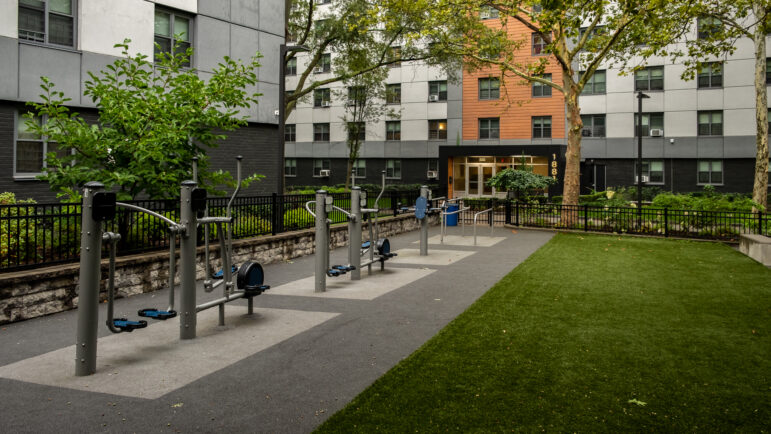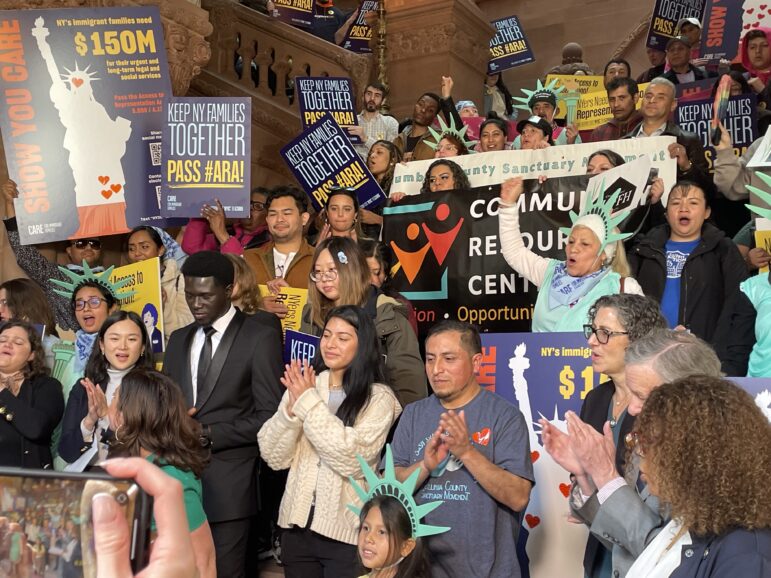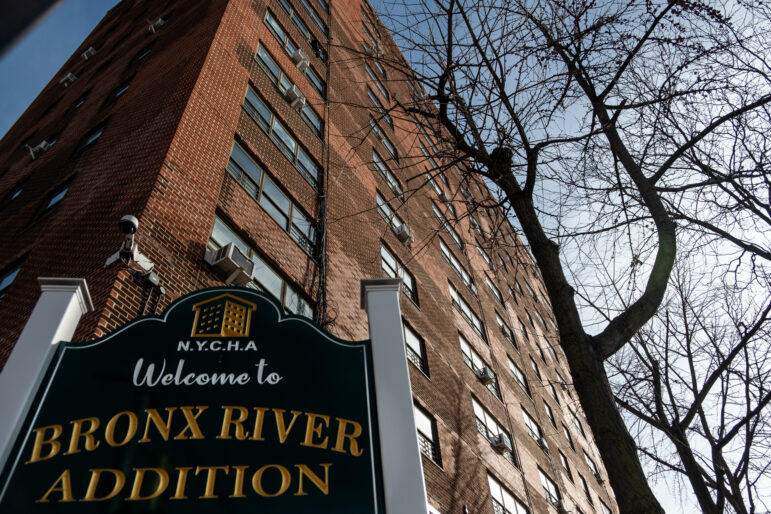
Photo by: Adi Talwar
Beloved by bikers, joggers and hikers, the Putnam Trail is an issue in the race for a West Bronx Council seat. But the bigger issue is whether voters will endorse, or reject, the pick of local political heavyweights.
The Putnam Trail is a vein of packed earth tracing an old railroad track through Van Cortlandt Park. For bikers, hikers and joggers, it connects the city’s street system to Westchester’s South County Trailway, And it divides the two Democrats running for the open City Council seat in the northwest Bronx’s 11th district.
After a good rain, huge puddles and extremely muddy terrain develop at a few points along the trail, making passage difficult—especially for cyclists. So there is a push to pave the path, which backers say will solve the mud problem, better connect the northwest Bronx to the regional bike-path system and make the trail more accessible to the disabled. Opponents believe asphalt will destroy the natural feel of the trail, necessitate cutting down dozens of trees and encourage cyclists to travel at excessive speeds, endangering walkers.
On the 11th district ballot for next Tuesday’s primary, businessman Clifford Stanton supports the paving, arguing that encouraging biking is critical. Saying he wants to better accommodate all trail users, Attorney Andrew Cohen prefers an alternative: compressed crush stone. In a race between two white men on the ideological center-left, it’s one of the few policy points on which the men differ sharply.
Beyond policy, however, the hopefuls are clearly defined.
Stanton, a businessman whose wholesale nut company supplies those ubiquitous Nuts 4 Nuts carts, emphasizes his lifelong local roots and the work he’s done for the community, like recruiting a charter middle school, fighting for traffic calming measures, sitting on the local development corporation board and, last year, launching a volunteer-staffed transportation program for senior citizens. He would have accomplished more, he argues, were it not for resistance from the Riverdale political establishment—incumbent Councilman Oliver Koppell, Assemblyman Jeffrey Dinowitz and the Ben Franklin Reform Democratic Club.
Cohen, an attorney who splits time between operating a law practice out of his home and caring for his four-year-old daughter, has the unfettered backing of that political establishment. A vice-chair of the Bronx Democratic Party and a former board member of the Ben Franklin Club, he touts endorsements from Congressmen Eliot Engel and Charles Rangel, the Bronx and Manhattan borough presidents, the three top Democrats running for mayor, the Working Families Party, the Stonewall Democratic Club and a panoply of organized labor, from the United Federation of Teachers to the Detectives Endowment Fund to 32BJ, the Communication Workers of America and the Central Labor Council.
Cohen argues the breadth of his support means people will “have his back” when he reaches City Hall, enabling him to get more done. Stanton counters that his opponent’s litany of endorsements means a long list of IOUs and foreshadows a lack of independence.
Riverdale’s role
The 11th district strings together a half-dozen neighborhoods separated by water, parks and highways, beginning with Wakefield in the northeast, across the Bronx River to Woodlawn, through a cemetery to Norwood and parts of Bedford Park, across the Jerome Park Reservoir to Kingsbridge and, further west, Riverdale—the area that has long dominated the 11th’s politics. Riverdale’s Koppell in the past two elections has been challenged only by other Riverdalians. The area is more affluent and significantly whiter than the rest of the district.
Cohen lives in Riverdale. Stanton lives in Kingsbridge Heights, but, touting his involvement in the PTA at P.S. 24 in the Spuyten Duyvil section of Riverdale and his work as a coach in the little league at Norwood’s Mosholu Montefiore Community Center, boasts that his life “is a Venn diagram of the district.”
Cohen and Stanton would have been part of a wider field, but Stanton challenged the petitions submitted to the Board of Elections by low-profile candidate Francisco Spies and by Shelly Keeling, a local businesswoman. Keeling claims Stanton had assured her he wasn’t going to challenge her, but broke his word. She has filed a long-shot federal lawsuit against the board and Stanton seeking reinstatement to the ballot.
Stanton says he felt compelled to challenge Keeling’s petitions because they were blatantly insufficient, bearing signatures from many people who didn’t live anywhere near the district and—he says—being filled out improperly in red ink. “Look to me the imperative here is replacing the machine,” he says, though adds: “That won’t go as far as saying the ends justify the means.”
Meanwhile, Stanton has assailed Cohen as unqualified for the Council job, lacking in tangible accomplishments for the community, and owned by the local Democratic establishment. “If you want an indicator of future behavior, look at what someone has done,” Stanton says. “Andy Cohen has no record.”
For his part, Cohen stresses his work as a community board member and a board member of Friends of Van Cortlandt Park, and denies that the organizational backing compromises his integrity. “I don’t feel beholden to anybody,” he says. “I think having their support will be a tremendous asset as I try to lead in the City Council and do my job. I don’t really see any conflict.”
Cohen also emphasizes his commitment to being a full-time councilmember, a subtle break from Koppell, whose legal work routinely made him one of the top outside earners on the City Council. (Despite the $112,500 salary, a Council post is technically a part-time job). Stanton’s campaign says he would also be a “full-time” member, resigning his company post, but perhaps spending a couple hours a week tending to his business interests.
Mail war
Voters in the 11th district (where this reporter lives) have been bombarded by mail for much of the summer. The vast majority of it is from Cohen—or for Cohen, if not from him. Cohen is one of the 18 Council candidates around the city getting support from Jobs 4 New York, an alliance of real-estate and construction-union interests. The PAC has spent $147,000 so far on Cohen and $30,500 against Stanton, or more than twice as much as Cohen’s campaign itself has spent. Cohen has raised $95,000 in private funds to Stanton’s $65,000. Both obtained the maximum $87,000 in public matching funds, but Stanton has spent more, leaving Cohen with more than twice as much money in the bank as the campaign enters its stretch run.
Most of the Cohen-related mail consists of vague slogans. But two Jobs 4 New York mailers went deep into negative territory, using a pole-dancer’s legs and other naughty symbolism to highlight Stanton’s receipt of $1,700 in campaign donations from Robert Gans, who besides being Stanton’s commercial landlord and the owner of Metropolitan Lumber also owns the stripclubs Scores and Penthouse Executive Club. By law, Jobs 4 New York can’t coordinate with Cohen’s campaign, permitting Cohen to distance himself from the mailings while also calling on Stanton to return the Gans money, which, Cohen says, has become a “distraction.”
In a statement, the Stanton campaign—which last week announced that he’d been named as the preferred candidate of the good-government organization Citizens Union—said in a statement: “The notion that Mr. Stanton would ever be in favor of adult clubs in our district is completely and utterly false and the allegation is offensive to him. Not only is our district not zoned for such clubs, but Mr. Stanton would fight tooth and nail to keep them out.”
Defining themselves and the district
At debates, Stanton and Cohen have agreed on many issues. They oppose a large, proposed expansion of the Hebrew Home that opponents believe would be out of character with the neighorhood, and both oppose a plan to by the company LG Electronics to build an office tower across the river in New Jersey that would obstruct Riverdale’s view. Both say that, if elected, they hope to make the district office more accessible to the non-Riverdale sections of the district. Both oppose plans for a large supportive housing development on 204th Street. Neither will name their candidate for mayor (Stanton, who donated money to Anthony Weiner in the 2009 cycle, says he hasn’t made up his mind yet.)
But subtle differences on policy have appeared. Both men say they would have voted against the NYPD inspector general bill—Stanton because he wants the mayor to be accountable for the cops, Cohen because he feels an inspector general appointed by the mayor would lack independence. Cohen would have voted for the expanded profiling ban, but Stanton thought it went too far.
At a debate sponsored by the Norwood News, where candidates were asked for their first legislative priority, Cohen said he wanted to “do more with the living wage.” Stanton called for speed cameras near every city school. Arguing that political meddling has undermined community boards, Stanton wants an independent panel to appoint board members. Cohen opposes this. Cohen has pledged to do participatory budgeting.
But the biggest difference between the two men, besides the degree of support each enjoys, might be how they see the district they’re hoping to represent. Asked to provide the rationale for his candidacy, Cohen says, “It’s a tremendous district—an incredibly diverse district economically, ethnically. We’ve been well-served by Oliver Koppell for the past 12 years but he can’t run. I think this is a tremendous opportunity with a change in admin.” While acknowledging that “There’s a tremendous concern about quality of life … and people expect a lot in terms of city service,” Cohen emphasizes the positive: “I think this is a great district.”
Stanton’s candidacy, on the other hand, is rooted in critique. “I’ve had a ringside seat for a while now and I’ve seen games that are played and I’ve seen the interests of the community take a back seat,” he says. “You think about some of the more happening communities in our city—the Upper West Side, Brooklyn Heights, Park Slope—there’s a certain dynamism that you feel when you enter those communities. That’s an element that has been missing from our community for ever. I think we’ve never really had that sense that, ‘Wow this place is happening.'”
In a week’s time, the voters will endorse one of those views of their district, ahead of a general election that will feature at least one other candidate, a Green Party member named John Reynolds.
Stanton, who tours the area in a large truck with a giant campaign poster on the side, says he believes the personal touch will make a difference. “If you ask the political consultants they’ll say ‘mail, mail, mail.’ My view of it is ‘doors, doors, doors.’ In a race like this, personal contact is everything.”


